#parallels exist to show contrast as well as similarity
Text
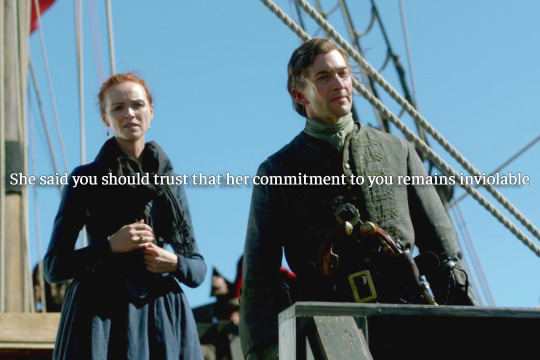



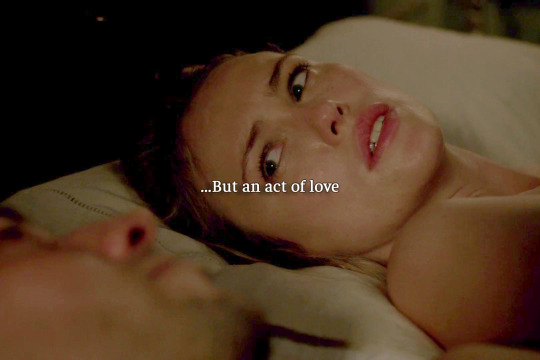



[id: a set of eight images from Black Sails. The first image shows Mrs. Hudson speaking to Woodes Rogers, with the text "She said you should trust that her commitment to you remains inviolable." The second image shows Flint and Silver together in Madi's house after her presumed death. The third image shows Eleanor in the fort firing on Rogers' ship, with the text "and that this is no betrayal..." The fourth image shows Flint taking the cache ashore on Skeleton Island, viewed through a spyglass. The fifth image shows Eleanor and Rogers talking in bed, with the text "...but an act of love." The sixth image shows Flint's face during the Dragons speech. The seventh image shows Eleanor lying dead in Flint's arms, with the text "An act she is determined to see through to its end." The eighth image shows Silver pointing a pistol at Flint on Skeleton Island. /end id]
#this parallel absolutely fucking destroyed me on the last rewatch#i dont usually pay much attention to eleanor and rogers#because well#i'd rather not#but the way eleanor and flint are both so desperate in the last season#and act in ways that to them demonstrate love and commitment#but the people around them cant see and accept that#for their own reasons#and its not enough#love isn't enough#i'm having a time over here#the way they still feel an affinity for each other even when they're on different sides of the war#there's no hatred there#oh yeah by the way#if anybody makes this about saying silver is the same as rogers i'm fucking coming for you#its not that simple#parallels exist to show contrast as well as similarity#and motivations matter in this show#black sails#james flint#john silver#eleanor guthrie
210 notes
·
View notes
Text
Ironic Parallels
For all that the political Left likes to claim that they're without bias or bigotry, just existing as a Jew in Leftist spaces will quickly demonstrate otherwise. And for maximum irony, the patterns of systemic antisemitism on the Left don't mirror right-wing antisemitism. Instead, they mirror right-wing racism. Imperfectly, for sure, but the parallels between how the Right treats Black people and how the Left treats Jews are striking.
Discussions of systemic bigotry are deflected with Whataboutisms so that the instigating issue isn't addressed. For African-Americans, it's often "What about Black-on-Black crime?" and similar by the Right-Wing, and for Jews, it's "What about Israel?"
Alternatively, a prominent political advocacy organization is attacked and defamed in order to again deflect and dismiss. "BLM is violent and engages in riots!" or the usual libels against ACORN, and "Israel is fascist!" or the usual libels against AIPAC and the ADL.
At the same time, prominent dead members have their words cherrypicked to make people feel good about themselves and their treatment of that group. Contrast how MLK's "I had a dream!" speech is used by the Right-Wing with how Anne Frank's "I believe that people are fundamentally good at heart" is used by the Left.
On that same theme, token members are held up to deflect accusations of systemic bias. African-American right-wingers prove that the Right Isn't Racist, and Jewish Antizionists prove that the Left isn't antisemitic--or, conversely, the extremist members of the individual group are cherrypicked to "prove" that the whole group is like them.
Furthermore, laws are proposed or passed to disrupt cultural practices; people of African descent face bias for having natural hair, while Jews routinely face people proposing banning circumcision, kosher slaughter, or the keeping of an eruv. But, you see, they can't be biased, because they know all about that group... based on what they saw on TV/Movies/Wikipedia, so they know that the group can handle these laws and rules just "fine".
The targeted group are treated as having an unfair advantage in the racial hierarchy. Consider the parallels between a right-winger complaining about Affirmative Action, and a Left-Winger saying that, since "Jews are White and therefore privileged, antisemitism isn't real discrimination."
But as soon as one shows up in a space outside of where they "belong", they're treated with suspicion until proven that they're acceptable... if ever. A POC in a store is treated as a potential thief, and a Jew in public is automatically acceptable to interrogate if they're a "Zionist".
Consider also how historical revisionism is rife as well. For POC, slavery and imperialism are erased from textbooks, as well as the backlash against Critical Race Theory, the 1619 Project and more. Meanwhile for Jews, pretty much nothing exists in educational curriculums between the start of the Diaspora (assuming it's even mentioned) and the Holocaust, which is treated as an aberration of bigotry instead of the culmination of centuries of hate. Even the admission of the real history is treated as an unforgiveable sin. Black people were never mistreated or enslaved, but were Guest Workers. Jews never came from the Levant and are Just White People From Europe.
And that's before we even get into systemic disenfranchisement. The original "ghetto" was the Jewish ghetto of Venice, and Jews are still routinely discriminated against for hiring, just as POC are.
But at the same time, everyone knows that "Blacks always play the race card" and that "Jews always accuse people of antisemitism."
And so on and so forth.
They're not perfect parallels--and I'm not saying that they are--but they are striking parallels in behavior.
__
I drafted this in April 2023, and it's been sitting in my drafts ever since, as I didn't have the courage to post it.
But given the current SURGE in Leftist Antisemitism, I somehow don't care anymore.
918 notes
·
View notes
Text
Let's Talk About Shinsou
*Note: Lmao, do I tag this as Anti Shinsou or Pro Shinsou??*
Despite being a pretty popular character overall, Shinsou seems to be under a lot of scrutiny with my fellow Bakugou antis. And I understand why. Our first introduction to him isn't a pleasant one; he's first shown taunting Class 1A about being attacked by villains (a generally traumatic experience) out of jealousy. It's also been noted that Aizawa spends more time training him than his actual class (though, this is more of an issue with Aizawa than Shinsou). Personality wise, he (subjectively) isn't pleasant or very entertaining either.
I'm impartial to him myself as I don't love him or hate him. He's just... there really (a fate many characters suffer). But you know what I think of when I think about Shinsou's character? Wasted potential.
My Hero Academia is constantly tossing the term rival around the show. There's the rivalry between Izuku, Bakugou, and Todoroki which is why they became the main trio (don't @ me for this I'm speaking technicalities here). There's also the infamous (one-sided) rivalry between All Might and Endeavor, a driving force behind not only Endeavor's actions against his family but a large part of the overall plot of the show.
When I first watched the Sports Festival and Izuku's match with Shinsou, I was positive they were setting them up to be rivals.
No, I don't mean the "rivalry" Izuku has with Bakugou (Bakugou stans don't @ me). I don't mean the friendly rivalries he has with Todoroki or Iida either.
I mean a straight-up rivalry. Where they don't become friends. Where they don't get along with or like one another (maybe a grudging respect at the most). I was sure Shinsou was going to be someone to constantly challenge Izuku; not only on a physical level, but ideologically too.
The Sports Festival partially set this up by calling attention to the similarities between Izuku's past and Shinsou's. While Izuku was discriminated against for his lack of quirk, Shinsou was treated differently and outcast because he had a "villainous" quirk. But they take on two different attitudes. Shinsou is bitter and full of contempt while Izuku was optimistic and determined to help a world full of people who shunned him. The show was deliberately setting up parallels between them.
But this dynamic is almost non-existent. Whatever interaction they do get is towards the end of the manga (Shinsou was introduced in the Sports Festival, an extremely early part of the series and in the show he's non-existent until season 5). And there's none of the previous complexity there was before.
Even if Shinsou was unlikable overall, it might have been worth it for him to be Izuku's real rival. His opposite not only in personality and attitude, but also heroics. Izuku can rely on his strength and the powers OF A give him, Shinsou would have to rely on his skills and brain. Their quirks are somewhat opposite to one another (at least in how they use them). Seeing them have to work together even though they'd usually approach things differently would have been way better than what we usually get.
I think that dynamic would have been a lot more interesting to watch than the trio or whatever you can Izuku and Bakugou (I will not refer to them as the Wonder Duo because wtf is that).
What do my fellow antis think? Would Shinsou have been a good rival if written well enough? Is there anyone else you would have preferred? Personally, I'd take anything over Izuku and Bakugou.
*Note: While we're on this topic, I think Monoma could have been Bakugou's rival. Someone who's calm and collected to contrast Bakugou's temper and whose quirk can easily rival his. I would have preferred that over subjecting Izuku to abuse under the guise of rivalry. I really wish Horikoshi would have kept them separate and allowed them to grow as heroes on their own without their toxic, codependent relationship. Maybe I would have tolerated Bakugou more. Monoma also isn't bothered by Bakugou so he wouldn't have had to go through the same thing Izuku did*
#bhna criticism#hitoshi shinsou#anti bakugou katsuki#kinda#mha critical#bnha critical#shinsou critical#i guess
67 notes
·
View notes
Text
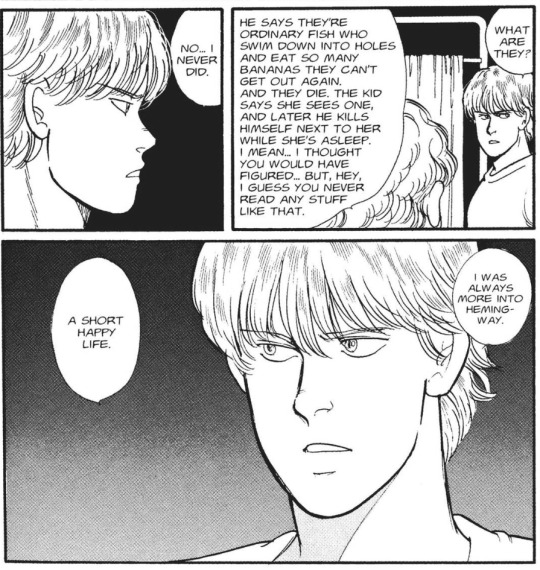
So for those of you who are anime only and/or haven't read the actually "Perfect Day For Bananafish" story by J.D. Salinger, Meredith's version here in the manga is far more accurate to the actual short story than what he says in the anime. ("If you see a bananafish at sea, you'll suddenly feel like dying.")
If you're anime only, you might have also wondered why Ash (who's later portrayed as a bit of a bookworm) has never heard of this story. (We'll assume that he never Googled it because of the manga taking place when Google didn't exist and the anime not wanting to deal with the plot hole lmao.)
There are a couple things I want to point out with this. First, what Ash is outright saying: "I was always more into Hemingway. A short happy life." This is uhhh not subtle. Ash is pretty clearly expressing his desire for exactly what happens at the end of his own life -- his life is short, but he finally finds happiness. And if you think that Ash is referring to a life that is short but entirely happy, keep in mind that "The Snows of Kilimanjaro," which Ash describes in the show, was written by Hemingway. Here, when describing Hemingway's work, he's talking about that leopard. He already knows he's gone too far to turn back.
This is in contrast to the protagonist of "Perfect Day for Bananafish," whose story more parallels Griffin at first glance: a war vet who gets out of a psychiatric hospital and dies after being "rescued" but not fully by a child, never really recovering from his experiences. However, as the namesake of the manga itself, we of course see Ash in the "Perfect Day" story as well -- especially in that Ash willingly walked toward his own death (as did the "Perfect Day" protagonist) whereas Hemingway's "Kilimanjaro" protagonist dies of infection against his will (more similar to Griffin -- or, alternatively, Shorter).
Both stories end in a protagonist dying prematurely, but Ash directly tells us that he's actively seeking out a short, happy life, rather than a drawn out one. To quote the second ending theme, RED by Survive Said the Prophet: "If I decide to burn instead of fading out ..."
If you've been following me for any time at all, you know that I disagree with the message that the end of the Banana Fish manga sends with Ash's death. That being said, I do think that it's what Ash wanted, and what he told the readers that he wanted from the very start. I simply think that Ash was incorrect about it being too late for him to turn back, and that it's irresponsible for the Banana Fish manga to end without him realizing that.
#banana fish#ash lynx#this post is VERY opinion heavy#and i'm open to other interpretations and feedback on my interpretation!#especially because it's been a while since i've read any of the stories in question that are mentioned here#but also please do not take this as an attack on any other opinion#i don't think there's a 'correct' take on the ending. i have my own thoughts on it but i'm not trying to speak ill of anyone else's#chaoslynx manga adventures
95 notes
·
View notes
Note
I would love to hear more mike wheeler - Steve Harrington masculinity thoughts (also whatever happened to Hopper to make him action guy my beloathed)! Also will we get a mike chapter for and they were married?
Okay yes! I am fascinated by Mike and Steve as narrative contrasts, and I always find myself looking for fic where the two of them meaningfully interact, and I keep meaning to write about them.
(Also: Mike deserves his own chapter of that fic, but he's getting folded into Dustin's. What Mike really deserves is his own fic that takes place in that universe, because I know what his deal is there and it's a doozy, but that is a very different post.)
Anyway! For starters, I don't think that Steve and Mike are intentionally meant to be foils. There's an element of it in the first season, where Steve exists to support Nancy's character, and Nancy and Mike are meant to be foils -- Steve is the Popular Kid, the antithesis of Mike and his friends' little group of nerds, he and Tommy and Carol are written into the same category as Troy but older and less actively murderous, and the fact that Nancy's dating him says things about her -- but they end up occupying oddly similar spaces and cool parallels come out of that anyway.
A core thing about it is that Steve and Mike are both the guy in their respective age group casts on the show. The Guy. The central one, the normal one, the presumed-to-be-straight one -- and yes, this is fandom and we have Opinions about that, but the Duffer brothers think they're both straight, and that matters here. They're white, they're able-bodied, they have money. They are, in a sense, normal.
Narratively, they very often act as central/POV character for scenes they're in, at least once Steve gets past the fistfight in S1 and awakens to the fact that he's a person who can make decisions. And that makes sense, because being The Guy also means they're the closest to the classic TV protagonist archetype, the guy who does the hero shit and gets the girl in the end. Hopper is also The Guy, and always has been: in S1 it's just him and Joyce, but even as we add more adults, the only real challenge to his The Guy status is Bob (which is of course why Bob had to die). Murray is a bizarre conspiracy nut, and queer-coded besides that. Owens is an affable bad guy. Alexei and Dmitri and Yuri are all Russian.
Being The Guy comes with a certain amount of baggage. All three of them have to be romantic leads, and have to be crossed in love about it. All three of them are protectors in one way or another. And all three of them are on occasion assholes who have one hell of a time with sincerity and affection.
And this is where we get into Toxic Masculinity, because again, while I don't think the Duffers intended a pile of parallels between these three guys, well. Firstly, The Guy as an archetype is built on a pile of toxic masculine stereotypes, so that's often there to begin with. Secondly, it's the same writers, so certain themes rhyme whether they're intended to or not.
In particular, one of the core tenets of toxic masculinity, not just in ST but as a thing in the world, is when and where it's acceptable to experience soft emotions of affection, care, and vulnerability. The first rule of toxic masculinity is don't. The second rule, the caveat rule, is a little asterisk saying 'except, occasionally, with a female romantic partner, if you absolutely must.'
And so we actually see a lot of unfolding of this in Steve! One thing we know about Steve, without precisely being told, is that he's deeply lonely -- for a popular kid he sure seems to only have two Actual Friends when the show starts and they hardly seem to even like each other. He has a new Favorite Person every season, and he clings to them with the joy of a devoted golden retriever. His mental image of happily-ever-after is a house full of kids with enough siblings to never get lonely, family vacations about close quarters and spending time together. We never see his parents. For all a lot of the 'horrible abuse' fanon is very much fanon, Steve is inarguably a lonely kid. And where do we see him reaching out for affection?
It's not Tommy and Carol, although until they break up he's constantly in their company unless he's alone with Nancy. They hardly even seem to like each other very much, and yet they've stayed at his empty house enough for Tommy to know about his mother's fireplace and Steve to insist he do laundry while he's here. No, the person who Steve is allowed to feel things with and for is Nancy, because she's the caveat, she's the exception. This is why Steve is consistently focused on getting Nancy back, getting a new girlfriend, getting a date. That's the rule!!!
The really fabulous thing about Steve's arc across the first three seasons, and even into S4, is that this quest for romantic affection and vulnerability is both thwarted and rewarded again and again. He tries to apologize to Nancy, to win her back: by the time he sees her again, Nancy's got a new boyfriend, but Steve has a new brother. Dustin is Steve's favorite person by the start of S3; he gets Steve's haircare secrets, he gets Steve's loyalty, he gets Steve's joy. In S3, Steve tries to pour his whole heart into a different girlfriend, and Robin turns him down flat while also simultaneously opening herself up with such vulnerability that they instantly become best friends. Robin is S4's Favorite Person, but the great thing about these relationships being platonic is that Steve gets to have more than one! He gets to have both Dustin and Robin in his life! He gets the other kids as part of the package! Bit by bit, instead of a girlfriend who Steve is "allowed" to be soft with, Steve gains actual friends who he gets to be real with whether it's allowed or not.
And the really tragic thing about Mike Wheeler is that he's doing the opposite. Mike starts out with three friends, three best friends, absolutely devoted to one another. As kids, they're young enough to be free of most of the stranglehold of toxic masculinity yet, although of course it's starting. And then there's El.
Mike charts a really interesting course over four seasons, and the shape of it is not a straight trajectory from 'Mike adores and is BFF with Will' to 'Mike thinks only about El.' Hell, from what we see of S1, the Party are all best friends pretty equally before Will goes missing -- Lucas is the one ready to break into a government lab for him, not Mike. Mike's trajectory is far more 'I derive the bulk of my personal self-worth from protecting other people, and as soon as somebody needs to be saved I go fully into Paladin Mode, making me feel worthwhile and important." It just so happens that the two people in Mike's field of vision who most generally need protection and saving are Will and El. Which leads to Mike's intense Will-focused devotion in S2 (El is gone but Will is also in really significant need, and Mike just straight-up activates, jumping immediately into solicitously taking care of his friend because Something Needs Doing And I Can Do It). And Mike's intense El-focused devotion in S4, where El needs a literal quest to come and rescue her. And just a lot of Mike in general.
The problem with all of that is the part where, unlike Steve who keeps forging new platonic relationships, Mike keeps neglecting his more and more. The S3 Will fight is so good at illustrating that, because look -- we all know Will has a crush on Mike, but at no point during that fight does Will ask, even subtextually, for romantic attention. He's asking for platonic attention, which Mike is absolutely failing to give. "Where's Dustin right now? You don't know, and you don't even care." But as Mike says, they're not kids any more -- and this is how growing up is supposed to work!
(Note: I don't want to say that it's toxic for Mike to be in love with El, or really caught up in that relationship -- he's fourteen! she's his first girlfriend! he thought she was dead! But Mike's an asshole in S3 because he's caught up enough to not notice his friend's feelings until they explode at him, and yeah, I do think part of that is because he knows he's Not Supposed To.)
S4 is a lot, because here's where we're really seeing the culmination of a lot of what Mike's been unfortunately moving towards. We've hit a point where those vulnerable feelings that Mike's allowed to share, at most, with his girlfriend, feel like too much to even share with his girlfriend. He can't say 'I love you'. He can't even talk to Will. The conversation he does have with Will is honestly mostly about Mike and his feelings of inadequacy, of not measuring up, not being special, but it has to be couched in the context of El. If there's a reverse-Bechdel test to be done on S4, past the very first episode I'm pretty sure Mike fails it -- I don't think he has a single conversation that isn't about his girlfriend in one capacity or another.
In contrast, S4 Steve is, yes, pretty focused on girls-in-general and Nancy-in-specific, and yeah, there's a little bit of backsliding going on there. But he's also having conversations with Robin about her fears and longings, having weird little interludes where Eddie's the one bringing up Nancy rather than Steve himself. He's hurt at the end when Nancy is clearly still with Jonathan, but he's able to move on, to go fold clothes and care about Robin's love life instead of his own -- his optimistic happy ending in S4 is that his best friend is going to get the girl, not him.
I think there's a lot more to say, which I only brushed on briefly here, about other aspects of Mike and Steve that work in parallel or contrast -- their protector thing, which feels very intrinsic but shows up very differently in both of them, the way Steve says 'I love you' so easily and Mike has trouble saying it at all, the way they are both very much extremely normal guys, at least on paper. There's so much to say. I think that has to be a different post.
I will say, in terms of Hopper: Jim Hopper is what it looks like when those pent-up feelings that you aren't allowed to express to anybody other than a romantic partner sit and fester for decades. Fuck, there were things about Vietnam he didn't even tell his wife, that sat like poison both emotional and biological between them. When we meet him in S1, he's processing grief with drugs and drinking and processing fear with rage. He has spent so much of the past four seasons processing fear as rage.
Of course Joyce is the one person he's allowed to, sometimes, on occasion, be soft with. Of course nearly his every interaction with Mike is macho dominance posturing. Of course the entire trajectory of his relationship with El is a push-pull of Hopper retreating into authoritarianism and anger instead of the terror of honesty, and then getting to see the consequences of that when his daughter pulls away. Every season has broken him down a little more that way, but then the yo-yo pulls back (Season 3 whyyyyyyyyy). By Season 4, he's been beaten and starved and frozen and shattered enough that we get maybe the most honest monologue of his life, to a Russian prison guard, because they're about to die so what do the rules matter any more. It's a clear window into an endless pit of self-loathing, because for twenty or thirty years Hopper's been letting those feelings eat in instead of out, and bit by bit they've been devouring him.
El is hope, for him, and Joyce is hope, and the cracks that broke open in Kamchatka to maybe let in a little more air that might not seal right back up again are hope. But it's hard. It's hard! It makes him an absolute asshole, including and especially towards the people he wants most to protect. (And there's that protector thing again.)
Anyway, I am on the record as liking Steve a lot and having very little patience for Mike and Hopper, but like. They're not that different, at their core. They just put the pieces together in a different order.
#stranger things#driveby meta attack#asked and answered#shit this is really making me want to write those D&D class breakdowns I keep promising#maybe I'll get to one or two of those this weekend#mike wheeler#steve harrington#jim hopper#at least a bit
80 notes
·
View notes
Text
I've been in a prolonged Star Wars mood recently which has coincided with me getting deep into Gundam so I've been comparing and contrasting their different approaches to similar ideas a lot, and I thought I might as well lay it all out in writing to get it out of my head.
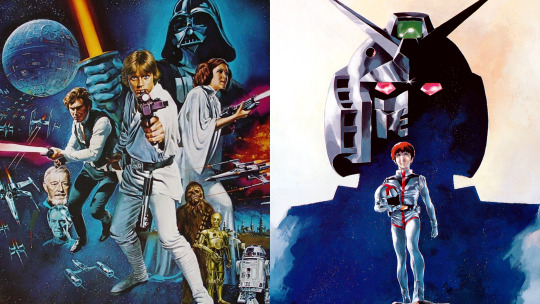
I'm specifically comparing Star Wars to UC Gundam, starting with the original Gundam which for context began airing in 1978, after A New Hope but before Empire Strikes Back. You can see a bit of A New Hope's visual influence in some aspects of Gundam.
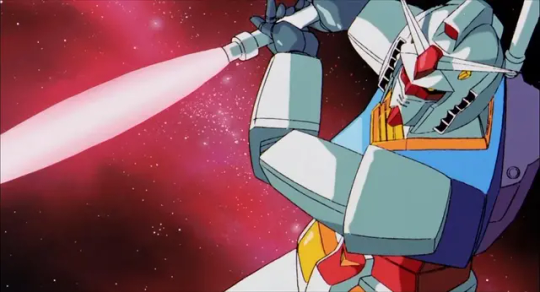
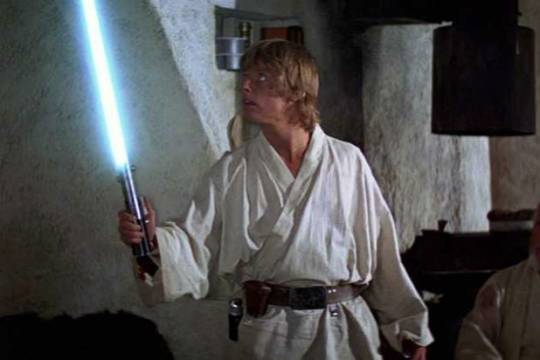
Both series prominently feature a laser sword of some description. "Lightsabers" in SW and "Beam Sabers" in Gundam. Other than the obvious difference of Beam Sabers being in scale with 18 meter tall mechs, there's also the difference in that the lightsaber is made out to be an elegant weapon, harkening back to a nostalgic imagining of knights and samurai, before the invention of less honorable firearms with future stories ascribing a deep cultural significance of the lightsaber to the people that made them.
The Gundam Beam Saber is in comparison a very utilitarian tool in a Mobile Suit's arsenal, usually carried right alongside rifles and bazookas. It still invokes a little bit of that knightly image, but the fact that it's usually used as a last resort weapon of desperation hampers the idea of it being a weapon of elegance or honorable combat. In a way they're more like real swords in that they're sidearms you only pull out in a battlefield when all your other options are unavailable.
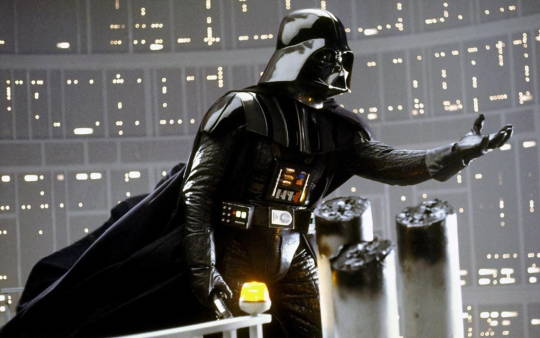
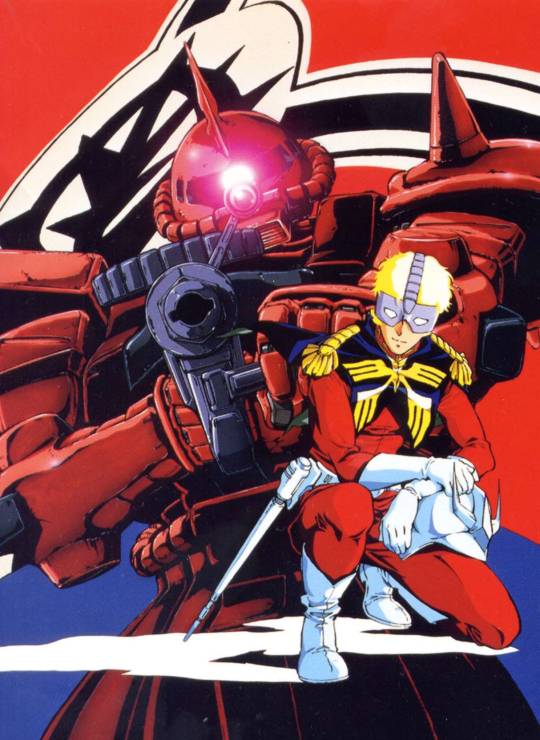
Another superficial similarity they share is their masked villains, I don't think it's a stretch to assume that Char Aznable was inspired a little bit by Darth Vader. Of course, since Gundam was pre-Empire, when so much of Vader hadn't been established yet and his most notable trait was having a cool costume, the two ended up diverging into wildly different characters.
Char is a pretty young man who uses a mask to cover his identity and Vader is old and scarred and needs the mask to breathe. Vader is the main character's father and Char is completely unrelated to his main character until they meet face to face late in the show. In a way Char is kind of more similar to Kylo Ren being masked pretty boys with daddy issues though again their arcs end up wildly diverging. Kylo and Vader both end up "redeemed" but Char isn't really the kind of character who can or should be redeemed.
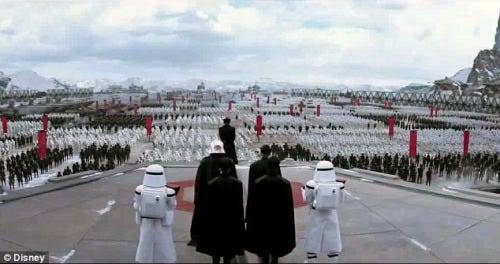
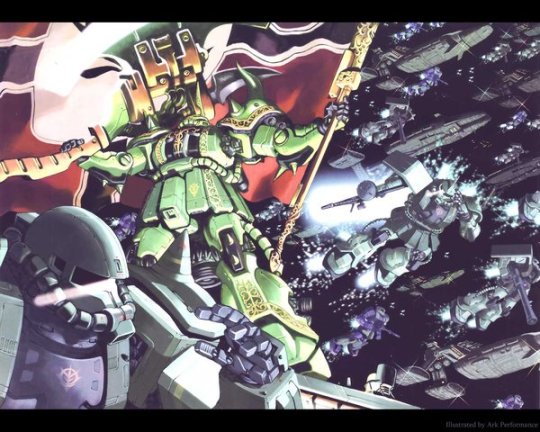
Somewhat related to the above, both Gundam and Star Wars have enemy factions who are meant to invoke Nazi Germany. Star Wars' invocation of German fascism (at least in the movies) is a lot more nebulous than Gundam's, communicating this analogy through visual reference to Nazi iconography while leaving the actions of the Empire more broadly as just general cartoon bad guy stuff.
The way Gundam compares the Principality of Zeon and the Nazis is a lot more specific and a lot more direct. The way the Zeon arms race plays out in the original is a direct parallel to the real-life Nazi wunderwaffen projects, where the Third Reich's internal friction and investments in ludicrous super weapons ended up costing them more than they gained, contributing to their eventual defeat. Gundam also takes place in our future (or atleast a future envisioned in 1978) so the real Nazis existed in this world and Hitler is brought up as a direct comparison to the original show's big bad.
(Writing this out, I had the thought that you could draw the same comparison between the Death Star and the wunderwaffen program, but idk if Star Wars itself has ever drawn that comparison.)
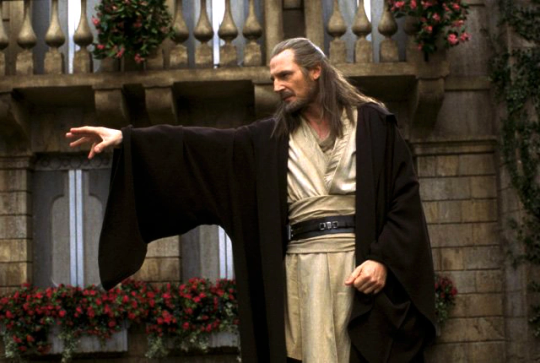
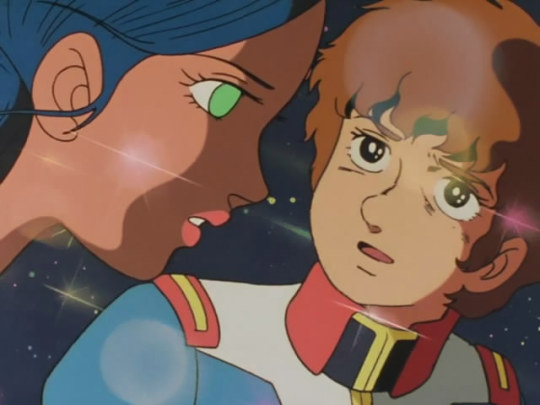
Another point of comparison is that both series heavily feature mystical, psychic powers inspired by the spiritualist movements of the day. The Force for Star Wars and Newtypes for Gundam. The Force is cribbing a lot aesthetically from eastern spiritualism while Gundam takes a lot more from the visual ideas of psychedelia.
The Force is far more concrete and straightforward than Newtype-ism. A magic energy field that can be used to perform great feats of power, and which has birthed two established sects of thought that are both treated as ancient. Force users are also clearly demarcated into Good and Evil camps, with specific powers and abilities locked behind a character's individual morality.
Newtypes in Gundam are very different from Sith or Jedi though. Rather than representing an ancient struggle of good vs evil, Newtypes represent a supposed evolution of the human soul, when humanity can communicate to each other psychically in an era where miscommunication is impossible. Supposedly.
Because whereas in Star Wars, the conflict of the Force is one of primordial good and evil, the conflict of the Newtype is one of heightened spiritualist ideas butting up against the mundane reality of different people operating under different and conflicting motivations. There aren't dark or light side Newtypes in the way that Force users are categorized, all of them share the core ability to bridge physical limitations to understand each other on a deep intimate level, but does that matter when their material conditions are inherently at odds? What happens when two people understand each other perfectly and they still have to fight and kill each other?
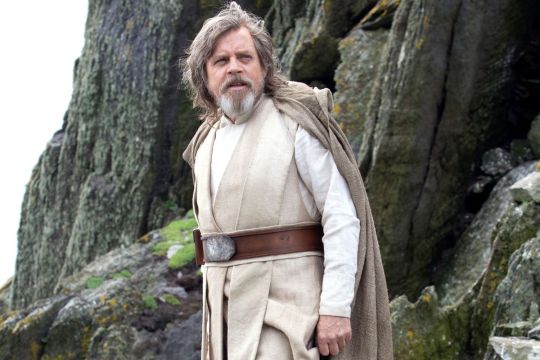
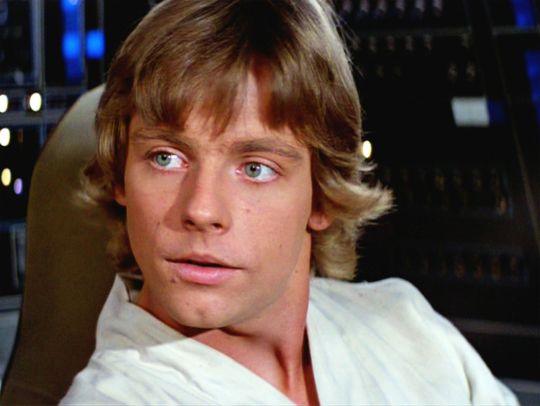
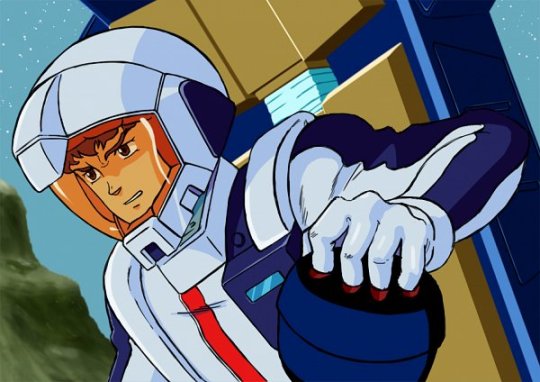
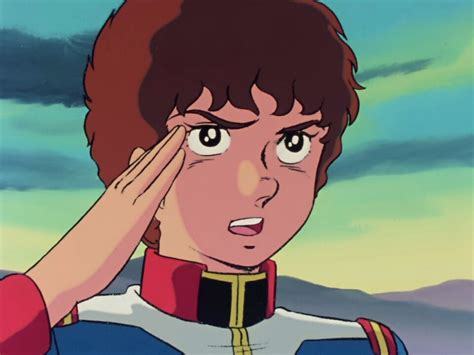
My last point of comparison is between the two "heroes" of both series. Luke Skywalker and Amuro Ray.
In a way, they're very similar characters. Both start out as young boys living relatively comfortable-if boring lives who are Called To Adventure and eventually awaken to their special powers to become great soldiers of their respective wars. Both are defined by the legacy of their fathers. Both are coming of age stories.
Where I find the comparison between them very interesting is the comparison of Luke at the end of his character arc (in The Last Jedi) and Amuro at the end of his (in Char's Counterattack). Luke in TLJ is a sad disillusioned old man who has failed in his attempt to rebuild the order that had been entrusted to him and who has stagnated into a miserable grandpa. For many longtime fans of the character this was a shock, and apparently for a lot of people felt like a disappointing betrayal. Because Luke was the Hero of The Rebellion, the Return of The Jedi. He was brave, and true, and more than just a normal man. So to see him so impotent felt wrong for many people.
I find it interesting that Amuro (subtler than Luke) also ends up in a similar spot, but in a way that feels far more appropriate to his character and to the tone of the narrative.
Because Amuro was not a hero. He was a child forced to become a soldier far younger than he should've been. Pressured by the dire, apocalyptic world surrounding him and the societal pressures of masculinity that hound him. Luke's inheritance from his father was a Lightsaber. A weapon of a great shining order which eventually was mutated by the Disney movies into a sort of Excalibur wielded only by the worthy virtuous heroes. Amuro's inheritance was the Gundam, the Devil's Machine, the first in a long line of military weapons, the image of which would haunt him for the rest of his tragically short life.
Amuro had at one point been a war hero, then a rebel fighting against the corrupt and self-interested Federation that had eagerly turned him into a human weapon. But his childhood of violence eventually left him no choice but to be subsumed into the military hierarchy he had at one point attempted to break free of. In terms of combat skill, Amuro was the best of the best by the end of his arc, but he had failed in every other regard. His Newtype abilities, once seen as a gateway to a future without misunderstandings, were now honed for violence. His final words ones of dumb confusion as he failed to understand the feelings of his enemy.
Luke gets the benefit of a Rey. The ability to once again become heroic and good and brave, to inhabit the comforting role of a gallant knight. And this step in his characterization is still met with confused hostility by most viewers. Amuro does not receive a similar luxury. He dies young and suddenly, with only the suggestion that his actions will eventually make things better, but it feels right with his character even for how unsatisfying it is.
Again, I don't know if I really have a coherent point with this post. Apologies if you've read this far and felt like I have wasted your time. For now, I think my main conclusion is that it's interesting to see how two different kinds of science fiction (heroic science-fantasy VS military sci-fi) approach similar ideas. I think the reason Luke's arc in TLJ fails for many is that the story of the original trilogy was fundamentally unfit to handle it. It's tacking on an unsatisfying tragedy onto a conventional, simple Hero's Journey rather than building on the foundation of societal critique the way Gundam does with Amuro.
Anyway. Bye.
#star wars#gundam#luke skywalker#amuro ray#meta analysis#comparison#spoilers for both series#long post#sorry for barfing a bunch of words at you
9 notes
·
View notes
Text
An essay about the best Disney TVA shows today
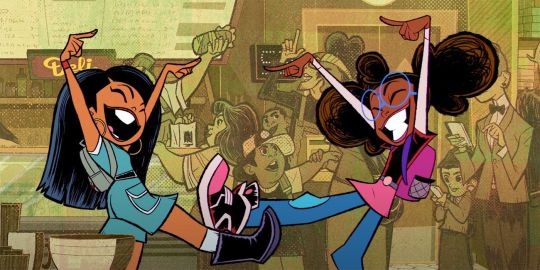
So Moon Girl and Devil Dinosaur is Disney TVA's newest hit. If you follow me, you know how much I love this show. There's so much good about it that I couldn't possibly cover all of it. But the more I think about it, the more I realize how similar it is to another relatively new DTVA show that just happens to be premiering its second season soon...
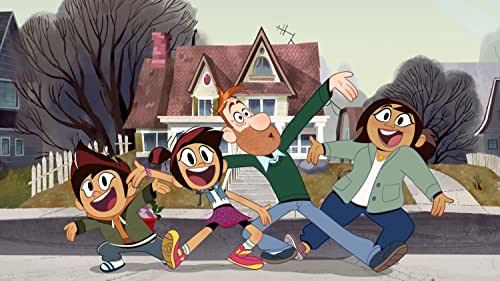
Now, I recognize the irony here. The LES and Brighton are probably the exact opposite settings. I should know. I live in a town just like Brighton. There's lots of corn here. Please help.
But beyond that surface level contrast, these shows hit a lot of the same concepts, but take them in different directions to fit the tone and setting. Let's discuss...
Spoilers for both shows. The spoilers start out light but by the end I'm just spilling all the beans. Please watch the shows.
continues under the break
1. Regular girl meets unlikely non-human best friend and that's literally the title of the show
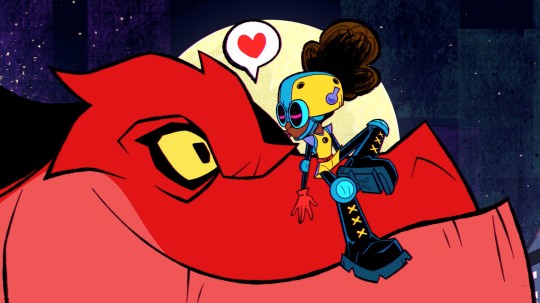

Probably the most obvious comparison. Heck, you could probably boil down any Disney property ever to that description if you try hard enough.
But, the similarities between DD and Scratch might as well end there, as they bring completely different characters to the table. Still worth getting out of the way here. I promise the rest of this post has more substance. Wait where are you going come back
2. Human best friend(s)
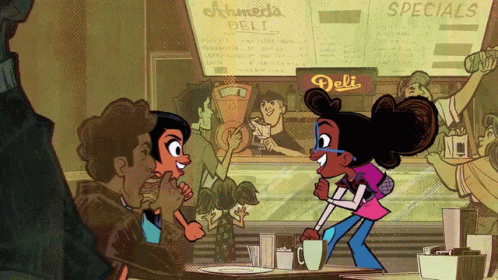
I've talked already about how I'm a big fan of Casey. As far as I know, she's a completely original character not found anywhere in the comics. She might be an amalgamation of other comic characters but I'm not sure. Either way, huge props for nailing it with her and making her feel like a natural fit.
So what do we know about Casey? Her biggest fixation, something we see the second we meet her, is her social media savviness. While Lunella can invent an app that warps space and time, Casey works best with the apps that already exist. Remind you of anybody?
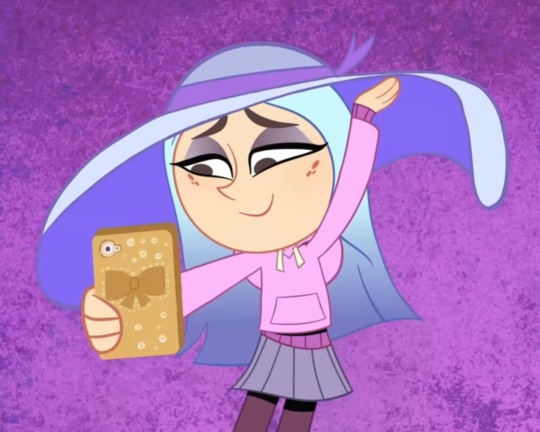
Now, I'm not on the Andrea bandwagon quite yet. She's definitely had her positive moments, namely the Christmas episode, but overall I don't categorize her in the "best friend" tier quite yet.
I bring her up because we can bring in another contrast between elements and how these sho was use similar concepts for different results. While Andrea's social media exploits are all about herself, Casey cares more about getting Moon Girl on the map, both helping out her best friend and doing a good deed. I'm glad we've gotten to a point where the social media savvy tween/teen can be a positive trait finally.
But I want to highlight the other side of Casey, and the part that makes it so intriguing to me that Lucase has been a central focus in this show. She may have the skills of Andrea, but she reminds me so much more of another of Molly's friends...
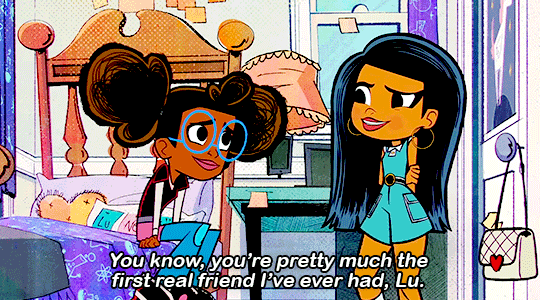
Who did Molly McGee meet to become her first real friend and de facto best friend who she then spent the rest of the show developing that friendship??
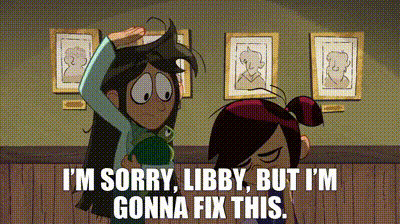
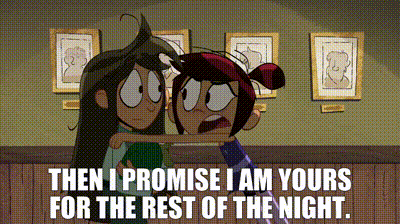
"Mazel Tov, Libby!" is my favorite episode of The Ghost and Molly McGee, and it's gonna be hard to top. Libby is my favorite character in that show and seeing her struggling and eventually breaking just hit me so hard. So when Molly and Libby came out of it better than ever, it proved how strong their bond truly was.
Casey blends Andrea's social media savviness with Libby's irl social awkwardness and difficulty at making friends. And Lunella to an even greater extent as seen in the sleepover. But together, Lucase bring out the best in each other, the same way that Molly and Libby do in their own show.
Also shoutout to Libby and Casey for being Jewish Latina DTVA girls with hyphenated last names and Bat Mitzvah centric episodes. Maybe should have led with that parallel.
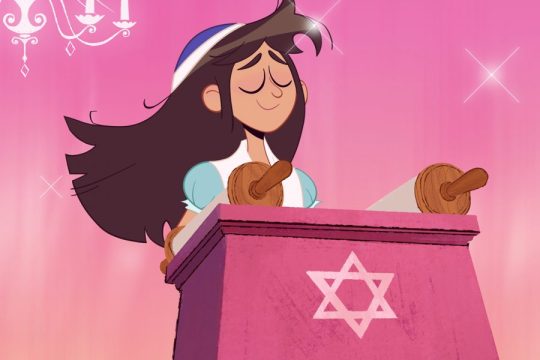
To be continued in a reblog so don't go anywhere... (link to part 2 if it's not already attached to this post)
#moon girl and devil dinosaur#lunella lafayette#moon girl#devil dinosaur#casey goldberg calderon#the ghost and molly mcgee#molly mcgee#scratch the ghost#andrea davenport#libby stein torres#mgadd spoilers#tgamm spoilers
62 notes
·
View notes
Text
So, the discord server I'm in was talking about pokemon insurgence, which reminded me of how I disliked Nora back then. Looking back, she really wasn't that bad, but I think the game still did her dirty. ESPECIALLY when she ended up having the damsel in distress in the end ( as I was told, I don't think I ever finished the game). So, after that lil convo, I decided to try and redesign Nova and rework some of her already existing aspects. Keep in mind, I haven't played the game in years, and I'm just going off memory and what I've been told. So without further ado....
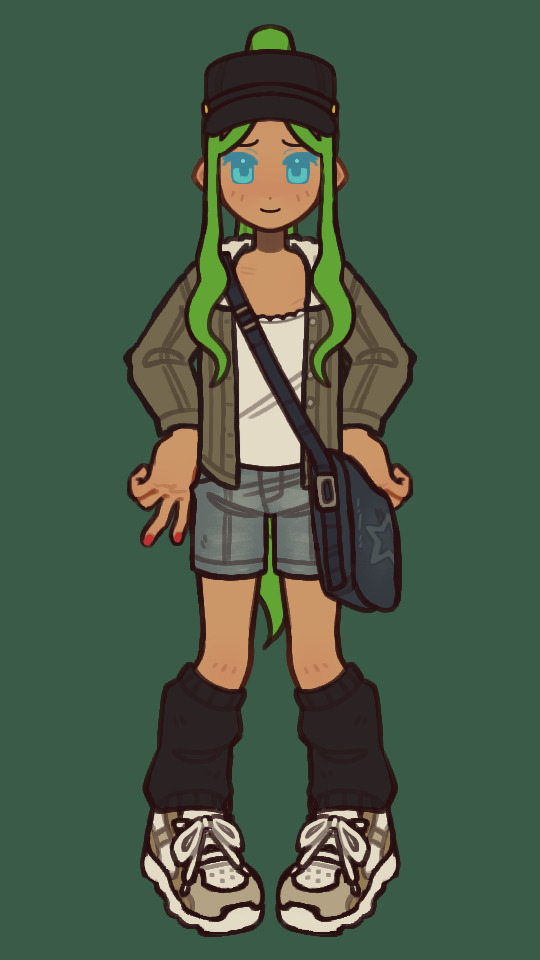
Nora! Let's first discuss what I did to her story ( from what I could gather) first.
I don't believe it was ever specified when Nora was chosen by Celebi. We just assume that she has been before the player and Damian. In this version of her, she has been chosen by Celebi for a while. Long enough for her to train and try and master her abilities. Despite this, she'd rather not be the one of the prophecy. She prefers peace over conflict, and the burden and stress of being a chosen one has been on her shoulders for assumedly years. It's worse given how she thought she was the only one. The only one who could carry this burden. It was a lonely experience, even with Celebi. Though, despite this, this loneliness gave her a bit of an ego too. She's strong, smart and resourceful and is tasked with essentially saving the world. This gives her an air of self importance, even when she's trying to do the good thing. Overall, Nora is not a bad person. It's just that she gets stuck in her head sometimes, being burdened with the task at hand. She's quick to realize her faults, and actively works to rectify them.
As for her design change, I wanted to portray her as an experienced trainer. The more muted colors that Damian had I gave to her, especially since her whole thing is that she's trying not to have eyes on her. Also why she has a hat now: she wants to keep on herself hidden until she literally can't.
Because I did Nora, I decided to do Damian too!
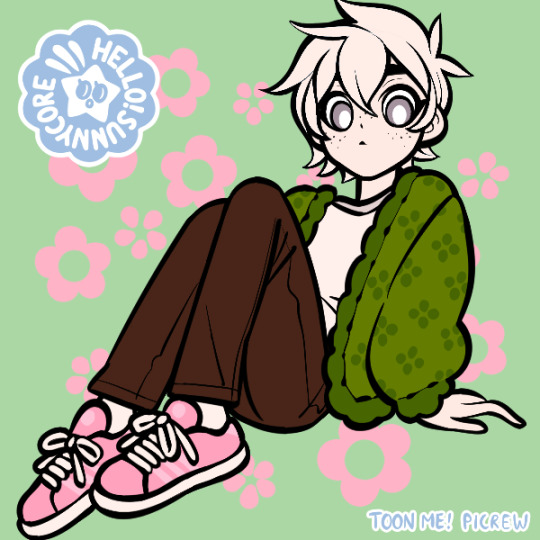

Left ( cardigan) is pre-shaymin Damian and right is post Shaymin Damian.
I! Don't exactly have any rewrites for Damien tbh. If I ever played the game again, maybe, but for now I was focusing on his parallel to Nora. While Nora is someone who sees being chosen as a burden, but does it anyway, Damian is someone who wants to be someone important,yet lacks the skills to do so. Shaymin coming to him was the best thing that happened to him, cause it meant that he was meant for something, not just a lonely kid from Telnor.
Bc of this, I ended up giving Damian's clothes more pop to juxtapose Nora's color scheme- especially when they're color schemes are so similar. I also gave Damian some pink in his design, to tie himself more with Shaymin. I should also note that Damian looks more like Shaymin than Nora looks like Celebi. This is intentional. Nora knows that people are after her and thus doesn't want to resemble Celebi too much. The most she does is wear a necklace resembling a clock( not shown in the picrew). Damien, eager to finally mean something, is more obvious. Not completely on the nose, but if you know what you are looking for, his clothes are a red flag. Again,just wanted to show the contrast of these two.
Also yeah I have Damian freckles bc why not. Whittle guy.
Aaaand yeah, that's it lol. Hope you guys liked this ramble. I must stress I haven't played insurgence in literal years, so I'm going off what people tell me here for Nora's rewrite. Hopefully you like her well enough!
11 notes
·
View notes
Text
My reasons for reading the Wheel of Time
Are you unsure about reading the Wheel of Time? Whether or not you read along with my blog project (explainer here and WOT link index here), this post may be for you!
If you don't want any spoilers before experiencing it yourself, I will just say: watch the first two seasons of the TV show, first. The adaptation changes a lot of the details, but the show is taking elements Robert Jordan wrote 30 years ago, more than a generation removed from today's sensibilities, and he changed his mind on a lot of things as he went on. Rafe Judkins is doing an incredible job of adapting to accommodate changing sensibilities/expectations, a change in medium, and the things RJ didn't decide to make part of his world until later books.
If you don't mind some light expectation-setting spoilers, I'm going to lay out why I love the Wheel of Time, some reasons to pick back up and/or keep going with the series if you ever started and fell off, as well as content notes by way of the downsides so you know what you're getting into.
I can't say whether any of my cons will be dealbreakers for you, or if the pros will make it worth the cons for any individual reader. All I can say is, knowing the bad, I still reread this series because it was worth it for me, and a lot of folks like me agree. If you don't think you can do it, full respect, hopefully I'll see you when I take breaks from this series. 🫡
My rationale
This is probably one of the dearest stories to my heart, and the one that I started refining this format with. I've been in this fandom for almost 15 years, and I wouldn't trade… well, maybe a second of it, but not much.
One of the most chunky fantasy series that exists, the Wheel of Time was begun in the late 1980s by Robert Jordan. When he passed in 2007, his wife and editor chose Brandon Sanderson to complete what they thought would be the final book (but ended up being three books) series with the help of extensive notes he left behind about his intentions for the story.
Even though it's over 30 years old, and there have been active discussion communities on just about all the social interactive platforms you can think of in that time, the Wheel of Time lacks a lot of spoiler-free resources. There are a couple of attempts to make spoiler-free wikis, but they just can't ever quite compare to the full-spoiler ones. There are Discord servers with first-time-reader channels, but not a lot of options for double checking what's safe to say at any given point for full-readers, OR ways for first-time readers to double check information, like if they think they misheard something, without asking and potentially getting spoiled by someone who misinterprets.
So, besides having keyword searchable notes for myself, my ultimate purpose in creating my notes in the first place is to help folks who haven't read the books, to have access to that sort of summary without having to search and get major later-plot spoilers. And since that led to everything else that led to this blog, I think it's only appropriate that I do, eventually, revise my notes and post them here.
I will probably be taking breaks between books. Most of the books in this series have 40, even 50+ chapters. I've already gone and entered it in my Google calendar for tracking (are you really surprised I do that?) and the first book will take me two and a half months to cover, all by itself, though the chapters only average out to ~15 pages each. We're going to be here at least 3 years, and with breaks between more like 4 or 5. Even so, I think it's right for me to do this one more time.
The Pros:
WIDE cast of characters, including women who get their own deep personalities, motivations, and arcs. Women are often in compare-and-contrast mirrors to men's similar experiences happening in parallel, and only rarely rewards or prizes to be won. (Caveat: even some people who have read the series may scoff at this one, but part of my efforts will be to help make the subtextual things a little more noticeable, because a LOT of character is in the subtext in these books because of the close-third unreliable narrator effect. It's fair to interpret them more shallowly, hell I used to, but then I started looking deeper and found so much more than I expected.)
Setup, foreshadowing, and payoff. Many plot seeds are planted, nurtured, and harvested at perfect ripeness. RJ was a conoisseur of foreshadowing in the subtext, text, and supertext of the story, and when each was most appropriate. Many of the old web rings, forums, and fan sites are long, long dead, but I can attest that this series does some absolutely incredible work with giving readers plenty of information to theorycraft widely and wildly. One particularly (in)famous mystery lasted 8 books across 17 years, and that's not even the longest one, just the easiest for us to point at.
Rarely introducing a new character where an old one will do. While there are over 2700 named characters, a lot of comparable stories would have near doubled that to tell this much story. It's really fun to see names pop back up in unexpected places, and track people who don't get POVs across the world as they say hello from different places and nudge the background plot along.
Evil is no simple thing. It's kind of a spoiler, yes, but I think it's fair when you look at the landscape in which it was written, and if we have a different standard today, it's due in no small part to the Wheel of Time's influence. The 80s and 90s in the fantasy corner of the publishing industry were not bastions of moral complexity. The Wheel of Time has the big literal supernatural capital-e Evil, and the humans who sign on to support it for their myriad reasons, but there are also multiple acknowledged human evils in opposition to it. The heroes and villains get a similar treatment of depth. Some people are nearer to the unquestioned poles of Good or Evil, but your fave is probably a war criminal at some point either way. This story goes on for 14 books plus a prequel, and that sort of simplicity doesn't inspire the sort of deep fandom these have. Nobody is as shallow as they seem at first glance, and most long-time fans have faves in the Light, the Dark, and everywhere in between.
Unreliable narration means there's a LOT more to this series than a surface reading indicates. There's a lot to the surface reading, and there's nothing wrong with it, unless you count "you don't really, fully understand a lot of the characters until you understand the discrepancies between their thoughts and their actions". My first reading was completely superficial and I still had a blast. But my second, and third? Especially after interacting with more of the fandom and honing my skills at media analysis, there's SO much more there to discover. Hopefully this read will help surface-readers get a bit more of the deep understanding, and if your surface reading previously felt unsatisfying or left you hating a lot of the characters, maybe this will help you better appreciate what's going on.
The Cons:
The sexism and gender binary. Gonna level with you, there's a lot of very heteronormative and gender essentialist vibes in here. It's cis binary genders only (with a singular terrible exception we'll deal with when we get to, but know that it's coming and it's handled pretty dreadfully even though you could give it a more charitable reading if you wanted to) and no matter the country or culture they're from, women and men each have very strange ideas about what the other gender is about. Robert Jordan was a US Southern cishet baby boomer Vietnam veteran, he almost certainly had some really unhinged ideas about gender relations. (Why it's not as much a con: two reasons. First, see unreliable narration above. Second, I think that one of the themes that really gets missed by a lot, a LOT of readers is that imposing binaries divides and weakens us. I will be exploring this whenever I remember that it's relevant to talk about and you may get real sick of it by the end. But, I think a lot of RJ's writing in this direction was intentionally drawing attention to how destructive it is. It's just never really stated out loud, it's once again in the subtext, and it doesn't always land the way I think he hoped. I promise, I will have the citations to back up my assertion by the end.)
Queerness: none good. There's one sweet sapphic relationship which is relegated to "gay until graduation" status at what amounts to a girls only boarding school, and never spoken of again except as friendship. In the encyclopedias, the characters in it are explicitly defined as straight. There are several lifelong lesbians who are explicitly one or the other of the kinds of evil. There's the one singular bad trans rep character. After the Sanderson portions start, there's one man who's said to be gay. RJ maintained in interviews that of course gay people existed, the story just wasn't any of theirs, which still burns me. (The show is making this MUCH better. I genuinely had faith in Rafe Judkins's adaptation after something he does in season 1 in this vein, and I have zero problem adding a little queer goggle view to all the interactions.)
We go six books where sexual assault is barely a concern, then get a handful of them all back to back in one book, with a few more sprinkled through afterward. There's a particularly troubling one against a male main character that a lot of the fandom doesn't even acknowledge as having happened. I'm not even gonna try to defend this, it's inexcusable, and if I'd known, I might not have read it, even if it's one of my favourite stories today. (Hashtag Please Fix It In The Show Rafe Judkins.)
The start is rough. The first book is very much a Lord of the Rings homage, where RJ hopes you'll see the places he diverges and stay along for the ride as he defies the standard fantasy outline of his day. The "come play with me in this space" of it means there are a number of potentially really interesting things that are just abandoned and never mentioned again, in alongside the things that were refined along the way. I won't always point these out because spoilers, but it's good to be prepared for some level of disappointment that the thing you want to see explored, isn't. (And hey, you can always explore it in fanfiction!)
And the series remained a work in progress to the end. RJ always thought he was just two or three books from done, ever since book 3. He wrote book 11 believing there would be just one more after it, but after his passing, his wife/editor Harriet McDougal, Brandon Sanderson, and the rest of what we call "Team Jordan" decided there was no way to fit what was in his notes into a single book, so they split it into the final three (books 12-14). So, sometimes things will feel like they're hurtling toward a destination that you know, from the rest of the stack, has to be several books off for a satisfying arc of it. Alls I can say is, at least we know the series has an end that it seems most people who reached it found fairly satisfying.
Adjacent to this, The Slog. There's a plot slowdown in the middle, not unlike the "middle of a trilogy" problem but it goes on for, at least for some readers and by some reckoning, 6 of the 14 books. Readers who like a fairly dry focus on politics and subtle character interaction more than plot will find this less painful. Readers like myself who need a plot to keep us hooked and moving forward will feel like the series drags its wheels in the mud for a couple thousand pages. This is anecdotally where a lot of readers quit the series, and they often cite this as a main reason. I can promise you the ending is worth the Slog to get there, if you're like me. But, my notes go from over 100 pages in Google Docs for book 4, to 57 for book 5, and just 12 pages for book 10, if you want a comparison of how thin the plot gets. (A lot of long-time readers will try to gaslight me about this, because they come out of the woodwork every time it comes up, and I'm telling you now: that's a great way to get blocked, because I have the receipts. I'm not saying the slog exists as a moral judgement against it or anyone who likes it. I'm literally just stating provable fact that the plot slows down and at least this reader feels it really hard.)
8 notes
·
View notes
Text
Noticing things in my rewatch of Ted Lasso
So, what can I say, Ted Lasso is the thing I've latched onto this time. My immediate family have been watching this show while I have, actually, and this is the ONLY piece of media we all can agree on liking. In all my years of existence I never thought such a piece of media existed. Okay, so rewatching seasons 1 and 2 after season 3 (because you've gotta capitalise on the Apple TV+ subscription lasting 1 month) is pretty interesting and here are the main things that have stuck out to me:
1.
Jamie and Roy tend to get along pretty well even in season 1, when they're not actively at each other's throats. In the episode with the charity gala, we actually see from the beginning how much they have in common. They're both very direct and on-point with why they hate each other, and only when faced with each other's direct reasons do they admit to them being somewhat true. They both view each other as arrogant, but when called out on their own arrogance they find it easier to admit it to each other. For 2 players who see themselves as being 'great' in some sense, they understand each other and know that their feelings about each other are mirrored. Even if they still despise the other person. There's also the fact we know Roy used to be a bit like Jamie when he was up-and-coming (a little primadonna b*tch), so they kind-of understand each other in that sense. They also have a similar sense of humour that has roots in insulting each other, to the point where hating each other is actually something they bond on (Jamie smirking and saying "here's to you dying" and Roy genuinely laughs at that because of how prickish it was). They're different forces on the team throughout season 1 (team-player and protector vs selfish star-player) and also contrasted for their ages but they're also paralleled so, so much. I knew they were being paralleled initially but I didn't realise how much until I rewatched that scene and realised how easily they could get along with each other. If this is what they're like when they hate each other's guts, no wonder they're so close when they start begrudgingly appreciating the other.
2.
There's a scene in the beginning of the show when Ted fixes the shower pressure in the Richmond locker rooms, and Roy realises this when turning on the shower. Then there's a funny bit after that when Colin walks in and gets knocked to the floor hard by the shower water, right? For some reason he walked straight in looking at the shower head and didn't even look down at the knob to switch it on. Maybe I'm overanalysing but it seems a bit odd to just walk in and push it the full way all while staring towards the ceiling- no matter how low or high the shower pressure is, the water is still going to hit you directly in the face if you stare directly at the shower head! However, if the show was planning all this while for Colin to be gay (which is plausible), this makes a lot of sense given what he says later about "looking down and thinking of global warming". He was looking straight up in this case, but it would make sense why he did not pay attention to what he was doing and got whacked in the face because of it. That's rough buddy.
3.
Actually, y'know, speaking of Colin, it also becomes more noticeable on rewatching the series that the footballer we see talk to Dr. Sharon the most is actually him. When she first arrives, afterwards when he recites "I am a strong and capable man, I am not a piece of sh*t" (which is so real of him, me too man), and later when the team plans on going out for drinks- he invites her to join, she agrees to have 1 drink and mentions having a session with him afterwards. He is shown to be really impacted by these sessions too, given he repeats "I am a strong and capable man" numerous times over. Then later he tells Trent in season 3 how those sessions helped him. It's very interesting to me looking back at all of this now, because other than the grindr comment everyone heard and were hoping would pay off in a storyline about being queer in football, I hadn't noticed any of this stuff before! Even if the writers weren't definitely intending for him to be gay in season 1, I feel like season 2 clearly conveys this intent looking back on it. Even in the jokes, there's that bit where Colin's being suffocated by those huge weights he clearly can't hold up not once but twice, and yet continues to use them. His need to appear like he can actually hold up those weights is too heavy and hurting him, the way pretending to be aggressively straight is- lifting heavier weights and physical strength as such is something people connect with being 'more masculine', just as being straight is 'more masculine'. He could just get different weights or something, work his way up, but pretending he can lift these ones is important to him to the point he would continue trying despite it almost suffocating him. Or it's just meant to be a funny joke (which it is), but with this specific character you can interpret it with deeper meaning, which is impressive. It's a really similar thing with how he takes pride in having a fancy lamborghini that is 'way too much car for him' and he cannot drive properly. It's nice to see build-up to this in prior seasons without being based in stereotypes of some sort- it's barely noticeable beforehand but when you watch the prior seasons again, it all tells a story, and I think that makes this some pretty good representation you don't see a lot, especially in media not explicitly marketed to queer people in some form. The effort put into distinguishing and developing its side characters even in the background or in throwaway lines is one of the reasons why this show is so good, in my opinion.
4.
At the beginning of season 2, when Jamie talks to Ted about his dad in the bar, he tells Ted he's lucky when Ted says his father was way harder on himself than he ever was on Ted. Ted quirks an eyebrow very quickly and doesn't respond, instead taking a sip of his beer. After knowing about what did happen with Ted's dad, it's something you can interpret either as avoiding the question or as an answer that subconsciously means yes and no. He was lucky to have a dad that was a kind father to him but unlucky because of how his father's harshness towards himself impacted him- whether his father meant for it to or not- and continues to impact him and shape his character through his life (as seen in the scene with his mother at the end of season 3). It really goes to show that you never know what someone else might be going through, or may have gone through; more often than not, it's not about "who's luckier" because you will never truly be able to measure that. Plus, honestly, what's the point in trying? How does that help anyone feel better regarding the actual things hurting them?
5.
When the team go to Liverpool to play Everton in season 1, Ted suggests watching a movie or having a pillow fight (strongly favouring the latter). In that episode, they watch a movie, but then later when they go to Amsterdam in season 3 they do actually have a pillow fight! Some real fun continuity there, even it's a shame Ted doesn't get to witness it.
6.
So I've already talked about my rewatch of Beard After Hours in more depth here, but another fun little thing I noticed in that is Jane's surname being Payne, which is just really funny to me as a homophone of 'pain'. Almost like a little acknowledgent of her and Beard's constant on-and-off insane relationship causing, well...some amount of pain.
7.
There's a bit in season 2 in the episode where Jamie's dad comes to watch the Richmond vs Man City match where it cuts from Sam to Jamie or Jamie to Sam speaking to their dads on their phones (via text or call). Jamie's phone says "Dad" in quotes while Sam's says Dad regularly. Honestly, this one I should've noticed the first time because it requires no extra context but I appreciate the attention to detail with that, showing how differently they view their fathers- Jamie not viewing his father as an actual one and making his dad's role in his life seem smaller by sarcastically not acknowledging him as such (which I quite support him in).
8.
I've noticed that in Rebecca's 2 main romance plotlines on the show, AKA with the 2 men she canonically had a significant intellectual and romantic connection with, both of them actually kind of embody what Bantr was trying to do. The idea of texting people with no pictures so that people connect on the basis of who they are with their brains ("where minds can come to undress"). Both with Sam and the Dutchman in Sunflowers (S3E6), when they were connecting, neither of them knew anything about the other's status or public image (and not their names), and connected first and foremost through their thoughts. Given how Rebecca's relationship with Rupert and her rivalry with Rupert takes place very heavily on a public stage, it makes sense that this would be contrasted with a more private form of love as that's what Rebecca needs. Her job involves being widely recognised, dealing with the press, having to respond publicly to everything Rupert does and deal with him at public events such as the gala regularly. His presence in her life is public and shadows her everywhere in the public, connected greatly with her public image. When she is not recognised as Ms. Welton, now owner of AFC Richmond and ex-wife of Mr. Mannion- when she is free of the pressures of people knowing her name and fame, that is when she is able to let go of her anger surrounding Rupert and come into her own as Rebecca in her relationships with other people.
9.
Roy's voice seems to change through the season 2, getting a lot harsher and hoarser I believe. Maybe to show him getting into a more mature role as a coach rather than a player, thus having to play into his 'wisdom of age' and so he sounds a bit older as a result. Like a sign of his character growing into himself as someone who isn't young anymore, and needs to find himself beyond being a footballer his whole life. However, I'm not entirely sure why or if this is a reason, maybe this was a choice just for the heck of it or Brett Goldstein deciding that suited Roy and growing into Roy like that.
10.
I was rewatching the end of S1E1 when Ted's on the phone with Michelle, saying, "that's what I'm doing though, I'm giving you that space," but after a pause he has to say "yeah, and myself, right", presumably after Michelle said so. I love how this implies that Michells feels that Ted either needs space from her as well after the experiences of therapy and all that, but also that she wants Ted to need the space from her because she doesn't want to be the one person splitting up this family. It has to be a thing that is necessary and healthy for them both, otherwise it'd feel like she caused him to do something that helps her but not him in this relationship. Their relationship, for the most part, has been shown as an example of a healthy marriage and divorce. Even when they broke up or were going through-- all this, they cared about each other and how they were doing and made sure to keep their power in their relationship as balanced. The way I see it, Michelle doesn't want to be the reason this relationship is failing, she wants both of them to need space so they can both be different when they meet again and hopefully fall back in love. It also nicely sets up Ted putting other people before himself continuously, where (to Ted) his decision was worth it because he gets to GIVE HER that space: whether he gets any or needs any or WANTS any is irrelevant to him. He did move for her, which puts pressure on her because, again, she cares about him and feels bad for being the reason he's in this situation. To Ted, she matters far more than his own comfort to the point he voluntarily would move all this way away from her just so it might make her happier. In hindsight, it makes perfect sense with Ted's fatal flaw, so to speak, being his desire to make everyone feel loved and comfortable without regard for himself. I have some mixed feelings about Michelle but those relate specifically to her relationship with Dr. Jacob in season 3. I feel like her being a character who cares about Ted and wants her marriage with him to work is very realistic and I'm glad to get a nice/sympathetic understanding of her through season 1.
There are loads of other really subtle details in the show out there that I'm discovering more of by reading other people's meta and watching their videos discussing it. You know it's a good show if the further you go, the more new things you uncover. If I think of anything to add, I'll probably just add it here, and if anyone seeing this has any thoughts on this show or on what I've said, I would love to hear about them please!
#ted lasso#ted lasso meta#rebecca welton#jamie tartt#roy kent#sam obisanya#colin hughes#coach beard#jane payne#rupert mannion#ted lasso rewatch#analysis time by me so I can track them in my tags#michelle lasso#posts originating from my brain
13 notes
·
View notes
Text
I lied I still have more thoughts on Ted Lasso. I’m thinking a lot about the parallels between Keeley’s relationship with Jack and Keeley’s relationship with Rebecca because there is a lot to compare and contrast there. Both extremely wealthy, powerful women who gave Keeley the opportunity to further her career into what it is now while having some sort of interpersonal relationship with her. The biggest difference between the relationship dynamics is not one is romantic and one is platonic, but how the relationships started.
With Rebecca, Keeley and her started out as friends, with Keeley having a job completely separate from Richmond. They were equals coming into their friendship, and while Rebecca did technically become Keeley’s boss, that was after an extremely close friendship had formed. There was a trust and openness there that I believe wouldn’t have happened if Rebecca had started as her boss and became her friend later. Even when Keeley worked for Rebecca, their relationship was friends first and employee/employer second.
Before becoming a couple, Jack was not only Keeley’s boss, but also her main financial investor for both bantr and KJPR. While it’s not clear if bantr had other investors besides Jack, KJPR exists because of Jack’s money. There’s an inherent power imbalance there that makes building that foundation of trust and openness impossible. If Jack and Keeley started dating first and then Jack invested in bantr and KJPR later it may have worked out but with Jack and Keeley there’s always been a question of which relationship is first in terms of importance in each of their minds. And I think in the latest episode it showed the difference in how they view their relationship. Keeley, the ever the romantic has seen Jack as her girlfriend first and boss second. While Jack has shown she’s clearly Keeley’s boss first and girlfriend second.
I think there’s also a difference in how they were raised. While we don’t know a lot about Rebecca’s childhood or job history prior to Richmond, it’s implied she grew up relatively wealthy, but not get-away-with-murder rich like Jack. I think an accurate comparison could be growing up with parents who are lawyers or doctors vs growing up with parents who are CEOs of megacorporations. Because of who her dad is, Jack likely grew up being placed under a microscope. Every action and decision being well thought out and carefully executed to protect her public image. I don’t believe Rebecca grew up in the public eye and didn’t start seeing the large amounts of wealth she does now before she met Rupert. She had room to grow and learn and be human.
I don’t think Jack is a bad person, I think she’s a bit emotionally stunted in that way people who are super wealthy are where they lack empathy and desperate for her dad’s approval. I say desperate for her dad’s approval based on the comment she made when she was first introduced about her dad wanting a son. It wouldn’t surprise me if many of her actions are due to her wanting to prove to her dad that she is just as good or better than any son her dad could’ve had. I think she genuinely cares and wants a relationship with Keeley, she is just worried about how they would present to her father, especially after Keeley’s video was leaked.
Tldr: Jack and Rebecca are very similar yet, very different and that’s highlighted in their individual relationships with Keeley. Growing up super rich is bad for social development and Jack should probably get a therapist
#ted lasso#keeley jones#rebecca welton#jack danvers#jackeeley#rebecca x keeley#keelbecca#what’s their ship name their names don’t fit together easily
36 notes
·
View notes
Text
Why I think the Garp, Koby, and Helmeppo side plot in opla is great - a silly little essay
This includes One Piece Live Action spoilers as well as a bit of Marineford
B4 we start: this is all just my opinion and thoughts I had while watching the live action.
I might've gotten some stuff wrong, or you may disagree with me. Also, English isn't my first language
I'm not expecting anyone to actually see this, I just need to write it down
Firstly, I find the choice of including Koby and Garp more early on very interesting, they did a great job showcasing the corruption within the Marines and also how toxic and even abusive Garp is (Helmeppo literally says so).
Koby is the first character we see be friends with Luffy, making us like and empathize with him. They go separate ways and after that, they parallel each other in many ways; Koby has a very strong sense of justice, just like Luffy, He wants to protect people, which Luffy is shown to do a lot. Other than Koby however, Luffy prioritizes his freedom, while Koby joins the Marines because he believes he can protect people that way.
They tell each other to “Be a good Pirate” and “Be a good Marine”, With their similarities Koby serves as a great tool to show throughout the season how corrupt the marines are, especially compared to the freedom of pirates like Luffy.
We meet Mihawk in the context of him getting a call from Garp, immediately showing the connection between Marines and Pirates. When this gets explained to Koby - and therefore also the viewer - he first realizes how corrupt the system of the Marines is. Helmeppo explains: “Warlords exist, so the marines don't have to do the dirty work”.
In Shells Town we’re led to believe that Helmeppo is “stupid and bad” and Koby is “smart and good” but later on we learn that Helmeppo was aware of how the marines work from the start and therefore wasn't enthusiastic about joining, his rank, or his duties like Koby was. When Koby finally learns the truth, he considers quitting, showing how far from his ideal of protecting citizens the navy is.
Garp literally says himself that as a marine, you operate in a cruel and unfair system and have to compromise your morals and ideals (which is why all marines are inherently immoral). He also states he could have been fleet admiral (aka highest-ranking marine) but turned it down bc he would “have to do it their way” and it would “take away his freedom” which shows his similarities to Luffy and Dragon. It is also bullshit bc he HAS to mostly do it their way, all Marines serve the world government / celestial dragons and not the people, which therefore means you cannot be free within the Marines.
In the Liveaction we see Garp let Luffy go, which is his idea of “doing things his way”, he seems to think by declining to be fleet admiral he keeps at least some degree of his autonomy; however, I personally think he is being ignorant, wanting to ignore how functioning in a corrupt system can never be moral, and you inherently lose your freedom.
Garp still believes the marines are necessary “to protect order” so he can't completely disagree with the system, clearly setting him apart from pirates like Luffy or Roger and the revolutionary army (who of course exist in contrast to the marines, showing and, well, rebelling against their cruelty).
Zeff points out the similarities between Luffy and Roger to Garp, who then mentions how Roger died, implying he’s just trying to protect Luffy. Garp seems to have a twisted view on protection; since he believes it is wrong as well as dangerous to be a pirate he physically abused Luffy from a young age, trying to stomp out his dream and make him follow in Garp's footsteps (same goes for Ace and somewhat Sabo of course).
This is also shown by how he acts in Marineford where he first tries to stop Luffy but then lets him through, isn't able to kill Ace, and has to be held back in order to not attack Akainu. Deep down, he seems to really care for those whom he considers Family, which clashes with his belief that Pirates are inherently immoral / bad.
I do believe his pursuit of Luffy throughout OPLA wasn't just him testing Luffy, as he states at the end. Garp gets really mad when he finds out Luffy has become a pirate, and still really wants to make him into a marine. The scene with Zeff would've also not been necessary, I think Garp really intends to protect Luffy (like Ace).
When he sees Luffy’s determination, however, he accepts that he can’t change him, showing that Luffy's strong will is more important to Garp than protecting him. This is also supported by the events in Marineford when Garp lets Luffy pass after seeing his resolve.
The moment Koby decides to stay in the Marines, he accepts that he’ll have to compromise his dream and agree to give up his original morals to some degree.
However, he’s still very similar to Luffy, and at this point also mirrors the “good” sides of Garp. He questions if they should really go after Luffy and stands up for his own beliefs when he gets the order to arrest the strawhats.
This way Koby (as well as Helmeppo, who does the same) showcases the corruption and unfairness of the marines because not like him the other marines present follow the irrational orders of their superior blindly.
Garp states at the end of OPLA that following orders doesn't make you a good marine, following your code does. He congratulates Koby and Helmeppo for standing up for what they believe is right, even when their orders said the contrary.
Concluding it’s safe to say that Garp, Koby, and even Helmeppo all show similarities to Luffy, they have strong beliefs, disagree with the way the marines are run and even go against their orders because of this. Showing these three as the side plot in OPLA drives the point Home how corrupt, immoral, and unfair the Marines are, and with the context of the world government and Celestial dragons, this gets even more weight.
8 notes
·
View notes
Text
Jack the Ripper and ST: Part 2, ‘Eddy’ Victor and James Stephen
Among the hundreds of suspects for who really was Jack the Ripper, one of the strongest contenders was actually a duo; Prince Albert ‘Eddy’ Victor and James Kenneth Stephen.
In part 1, I emphatically argued for Edward’s role as JTR, but he may not have been working totally alone. Of the four suspects I’ll discuss in these parts, Eddy fits with Edward extremely well and the only reason he wasn’t taken in as JTR was because it would’ve been physically impossible for him to be in the place of the murders. That wouldn’t exactly be an issue for our Edward, would it?
Below the cut, I’ll establish parallels because they’re genuinely just as interesting than the murders themself, the relationship Eddy and James had, how they would’ve functioned as murderers vs how Edward and his partner did function as murderers, and how both of them died.
Establishing Parallels
Edward
First, the most obvious of parallels, names. Prince Albert Victor os the name he’s known by historically, but his full name was Albert Victor Christian Edward and the name the world called him was Eddy.
In his full name we see direct connections to Victor, Edward’s father, Christianity (which is a major theme in the show after the Creels are introduced), and, of course, Edward. The prince could’ve paralleled Victor Creel, but he chooses to go by Eddy. Not Victor, not even Edward, but Eddy. Now, this guy definitely is meant to parallel Edward Creel when we look at his childhood (which we will), but his choice of going by Eddy not only reinforces Eddy being Edward, but it contributes to the theory of Edward becoming Eddie by overtaking his corpse as his own mangled body is unusable after the burns — aka, Eddie puppet theory.
Even more than just the names, there were reports of Eddy as a child that sound eerily similar to our own Creel history. It was said that Eddy had an, “…elegant and possessive mother… ‘want of manliness’… ‘shrinking from horseplay’… [and a] ‘sweet, gentle, quiet and charming’ nature.” That doesn’t sound familiar? Try this one.
“…they would like to make a man of the world of him. Into that world he refused to be initiated.”
Come on.

Eddy also had a younger brother, born so close in age they were treated like twins. They went through education together and the educators refused to separate them because, without his brother, Eddy’s teachers felt like they could not teach him. He was far too “mentally absent”. Broken, if you will.
Again?

thanks em
Another fun little experience Eddy had once he was older was with Oscar Browning, who, “made pets of those undergraduates who were handsome and attractive.”
I’m not even gonna say it because I hate it!
Even moreso, his family held the high expectation for him to marry a woman who was charming, sensible, and pretty. He failed to achieve this goal several times, likely because he was homosexual.
Peter
Yeah. He’s here because god forbid I make ONE post without him working his way in. Here’s a real nice parallel to James Stephen — where Peter is most heavily noticed by the Saint Peter painting in the Russian church, James Stephen was a member of the Apostles intellectual society. Saint Peter us one of Jesus’ twelve Apostles.
James Stephen also has a cousin names Virginia Woolfe! This would also mean that Edward and Peter were likely cousins, seeing as Virginia is Edward’s sister, and then being cousins…. is really fucking funny.
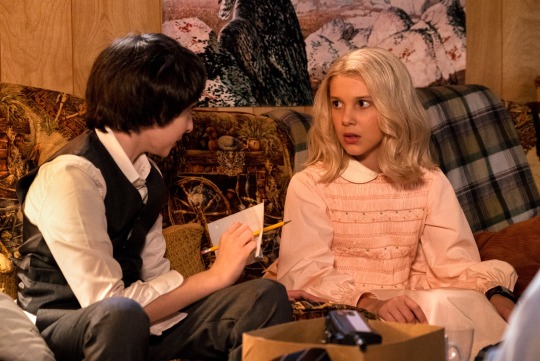
I love it when bad couples parallel bad couples.
One more little thing is that James Stephen was a poet, and much of what he wrote can reflect the show with mentions of curses and melodies,
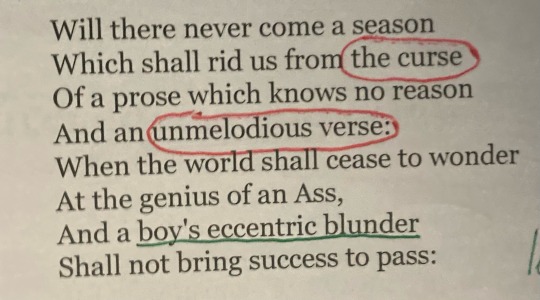
as well as the concept of twins demonstrating the contrast and similarity as a huge theme in mankind.
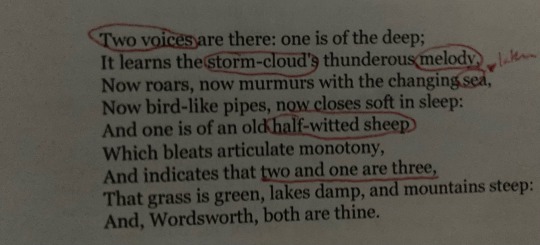
Peter’s parallels may not seem strong right now, but it’s hard to draw a ton of parallels to a character who doesn’t yet exist. Just trust me.
Homosexuality
When James and Eddy met, it was because James had been chosen to tutor Eddy before he was to be sent to Trinity College. While Eddy would’ve been 24, figuring out the time this took place in Edward’s life isn’t difficult because of the Brenner figure I mentioned earlier. Eddy met the man who would treat people as his pets during his first semester at Trinity College, which draws the comparison between the lab and the college, effectively placing Peter and Edward’s time right before Edward was sent off to Brenner. Makes pretty damn good sense if they’re meant to be an alternate version of Creelarke.
I’d like to consider this time to be when Peter and Edward were in some sort of summer program together, or something similar. This post by @aemiron-main points out the very likely possibility of Owens being Edward’s father and how, although I have called Peter Owens’ son in the past, the inly information we have that connects him to Owens is that he has Peter’s old school projects. Considering the summer camp is directly connected to both Ruth and Rose being in the same place as Petey McHew, we get this: Rose (Creel), Ruth (Owens), and Petey (Peter) were all in the same place at the same time during the summer.
It’s possible that Owens, as Edward’s father, had Peter help Edward in a summer school before they moved to Hawkins for the new school year.
This relationship is especially fascinating because James was a Christian man who actively participated in Christian activities (see; apostles society) — it’s likely this summer was teaching more than math and science. Where Hames was highly intellectual in comparison to Edward, this may translate to Peter’s greater success at pretending to be normal and straight compared to Edward’s ability to do the same.
Any feelings James felt for Eddy were very intense despite this. Strong enough to write about hating a specific woman and a specific man in his poem Men and Women. He was enraged by everything about this woman and this man was described in grief as his body became vacant of his soul and was nothing more than a corpse. He also mentions a missing eye replaced with glass in this man. Familiar?

It’s all familiar because the duffers fucking hate me and want me dead.
James also killed himself because of Edward’s death. By the way. What normal, heterosexual behavior.
Eddy was also heavily accused of homosexuality numerous times throughout his life by family, friends, press, and even historians. It wasn’t just James either, oh no, the entire Cleveland Scandal (involvement with a homosexual brothel) followed him for the rest of his life.
These bitches gay.
As Murderers
Here’s where things get really interesting.
1886 — two years before the Whitechapel murders — James suffered a massive head injury. He was struck by an object from a moving train, permanently altering his brain.

His behavior quickly devolved and he became deluded that he was a painter of great genius…

…and he eventually proclaimed that the doctors told him he would either die or go completely mad.


He was committed to an asylum in 1891.
Not only is the Phineas Gage parallel coming back, it’s being tied to the time Will was being used as a puppet by Edward. Edward learned that tactic from somewhere.
In the theory that James and Eddy were a murderous duo, it was suspected that James was the one controlling Eddy because his profile matches JtR so well. His hatred for women and mental status are the source of this belief. Their relationship in murder was described as, “…mutually dependent, with Stephen as the dominant partner.”
This dynamic could very sell explain why there’s so much puppetry in Vecna’s image.
i ran out of image room :(
Although Peter is no longer an active participant, Edward is still being guided by his ideals. Puppeteered, even. It isn’t something he rejects.
There are so, so many parallels between characters in ST and JtR’s victims, but this is already long. I’ll simply say that the death of Mary Jane Kelly is extremely similar to what we see in Mother Alice’s bedrooom, and I already pointed out the F in the first part. I’d only recommend looking into MJK if you’re very comfortable with looking at gore.
Also, Eddy’s tomb is surrounded by Saints. Peter follows him to death and beyond (which is about to be really ironic).
Deaths
I’ll keep this bit quick.
James died in 1892 due to mania triggered by the death of Eddy. He starved himself for 20 days as an act of suicide, seeing as he was in an asylum and didn’t have many choices. The timeline would indicate that Peter died in 1964, which also happens to be the year Kali was born in London.
That deserves its own post I think.
More importantly is Eddy’s death. Supposedly, he died if pneumonia, but it is theorized that his death was faked to remove him from his line of succession to the throne, which is cool on its own but what makes it really good is that media chose Eddy to be the one who takes the Dracula persona I mentioned in part 1. There was also a novel written after his death called the The Prince of Mirrors which is about his life with James.
There also happens to be a Sherlock Holmes interpretation of him in Sherlock Holmes: The Hidden Years, which shows him as a tyrannical ming who rules after the mysterious deaths of his grandmother and father. The throne he supposedly died to be removed from.
There’s a lot influencing this after-death image of Eddy in Dracula and kingship, which makes Vecna’s name of the Undying King pretty ironic.
#IM SO TIRED#if it sucks a little uhhhhh no it doesnt :3#el oh wl#im in tesrs over the description of the book tho it’s so cute#peter st#edward creel#uh#edeter#<- only person to ever use this tag Ever#idk what else to call them#jtr theory
19 notes
·
View notes
Text
Doing a live reading of the manga with my dearest best friend is fun for multiple reasons, but I think one of them is seeing how Kureo Mado is presented and how someone reading for the first time may respond to him (even as I call him my baby girl and half-jokingly come to his defence every so often)
From what I know, he’s not a well-liked character, and I can understand why, but for me, he is certainly one of my favourites, and I especially love how his character came to haunt the narrative in a sense.
He’s portrayed at first as a heartless and maddened killer, and then we first get a glimpse of humanity through his wedding ring. Most of what we know about the gentler side of him, we know from Akira, another favourite character of mine, and one who witnessed both the best sides to her father and the worst.
He was a good father, we know that for certain, and we know they had a positive relationship with one another, despite the lingering shadow of grief Kasuka left behind. And, like Kasuka, Kureo ended up putting his work - and obsession - before all else, leading to his demise, and leading to Akira being all alone. Albeit, Kasuka’s reason was very different to his.
I’d love to see more light shone on the softer side of his character, because something my best friend pointed out is the parallels between the ring on his finger and the ring on Ryouko’s, showing that neither human nor ghoul are evil, and how similar both ‘sides’, if you will, are in the end. Kureo’s existence as a maddened killer contrasted with the reveal of humanity was a way to show that in this world, even the most heartless are more than what they seem.
And somehow this got me thinking what this man would do if he got ghoulified… perhaps a thought for another day.
I guess the point is, I really like Kureo, and I wish he was understood more as a character and his depth was actually acknowledged. Also I just think he and Akira deserve to have a silly father-daughter times to make up for all the horrors. Please god let Akira have this.
14 notes
·
View notes
Note
It’s the contrast between Rhaenyra and Dany that stands out to me. The thing that defines Dany the most is that she cares deeply about others that she puts their interests and safety above her own personal desires, whereas Rhaenyra cares mainly about herself even if it means trampling the common people in the process. It is rather striking that Dany does everything in her power to bring peace to Mereen, even sacrificing her ambition to rule Westeros and her personal happiness by marrying a man she does not want in hopes that this would stop the bloodshed in the streets and spare her people. Compare and contrast to Rhaenyra blatant rejection of peace as symbolized by Corlys Velaryon’s suggestions of war-ending efforts for the sake of her personal vengeance. It is very clear that ruling is mainly a responsibility and duty to the people in Dany’s eyes, but for Rhaenyra, it is very much about her rights and what she is owed, even if that means sacrificing her people for it.
The points of contrast only continue to pile up on close examination of both narratives. Dany cares about her brother despite his sadistic and abusive behavior towards her and tries to save him to the very end; Rhaenyra wanted her 10-year-old brother “questioned sharply” in an effort to cover up her own affair. Dany cares about children, from the ones savaged by the slavers to make a point to her highborn hostages that she refuses to execute to poor little Hazzea to Missandei; Rhaenyra started a manhunt for her nephew and niece and was all too ready to scapegoat Addam Velaryon and Nettles. Granted, Dany commits or condones acts like torturing the wineseller’s daughters but even then, the basis of her actions is a far cry from Rhaenyra’s, who had no qualms about having an innocent man seized, executed and fed to her dragon for opposing her and who freely made use of torturers in trying to locate Aegon II and his children. At her most cruel, Dany’s thoughts still showed her remorse when she had to confront the reality of her orders in the form of the slowly dying masters, and her motives were not simply about personal revenge, though it is an element. In contrast, Rhaenyra doubled down on her cruelty to the very end, and her pursuit of personal vengeance only contributed to prolonging the war. To put it simply, Dany is a savior and liberator while Rhaenyra was a tyrant.
*EDITED POST* (10/16/23)
Probably responding to this post.
A)
that you are thinking mainly about "contrasts" but contrasts cannot exist without making similarities when we are trying to analyze a text. Just because the characters are very different, doesn't mean we can't draw any parallels or even see some character traits and explain why/how they manifest differently. I already said as much as to the process of comparing/contrasting things to see what role they play in the narratives' themes and events in the post anon refers to, linked above:
"Comparisons" do not have to mean "they are exactly alike or share many traits", it can refer to that specific process of getting information itself.
"Comparison" can be a shortening of "qualitative comparative analysis". "Compare" as in I put these characters side by side, make a Venn Diagram in my mind, and identify what similarities and differences they have.
B)
Mainly because I know that people are criticizing Rhaenyra's character by using Dany while they do not really do the same for other Targ women because Rhaenyra does not go out of her way to provide for smallfolk (neither did Rhaena or Visenya, btw, and these are celebrated apart from the easily identifiable misogynist's most misogynist criticisms). Visenya may have stopped from killing the Vale kid, but she's not really out here trying to make lives better or smallfolk exactly as her sister and Alysanne have.
And my thing, if you read my posts well, was that Rhaenyra became a tyrant in the setting of misogyny--she would have been a so-so ruler, not a tyrant, if she was left alone. I already said Dany was her moral and political superior. SEVERAL TIMES! Nevertheless, Rhaenyra is Dany's ancestor as well as narratively how the in-world should look at Dany, her purpose, and the Targ dynasty's progression ANd both have to deal with being the first to-be woman ruler of a huge realm/the misogyny that will come with that even with them affected/approaching this problem differently.
That Rhaenyra grew up a princess like how most princesses behave and then develop self-determination doesn't negate the misogyny. Plus the arguments that how she was "always" either an amoral or incompetent ruler tend to be misogynist and/or have a double standard.
The contrast doesn't negate the purposes of their stories and how the women are connected to dragons, the decline of female power for male power, and fertility. This is the point of the kind of "comparison" and "likeness" that anon is describing. Dany herself is a very good, altruistic person who really a few Targs measure up to in that specific sense, and yet was targeted for being a woman looking for power. Nearly killed many times. Without Dany's cleverness, compassion, and intuition (as most people do not possess), that should tell us that the misogyny Rhaenyra faces is just as devastating as feminists have been saying. Misogyny doesn't care about morality, it tries to make itself the "morality".
EDIT (8/21/23)
THIS is a great post by @mononijikayu about medieval queens, female rulers, the history of how women in leadership positions were made and seen as threats to the very structure of social "order", and contextualizing Rhaenyra thru Empress Matilda. I didn't even know about Matilda's husband being comparable to Rhaneyra's Daemon! PLZ READ!!!!
Excerpt:
just as much, along with these fictitious portrayals, more lies are depicted. these women are considered vixens that cause havoc to men by shifting them into desires and danger. through the written word, we see how women are cast in roles of villains in men’s lives. it is because by their conclusive thoughts, women are the only creatures that are able to turn ‘good honorable men’ into despicable creatures who do shameful, deplorable acts for the sake of women’s pleasures.
[...]
it is within this narrative that ancient chroniclers declare that women were in fact the doom of men. if they were not able to control the dangers posed by the wiles of women, then the foundations of the mighty society they had built would be up in flames.
[...]
as i mentioned, these factors of community are written down and preserved. and with that, the example of the ancients were the foundations by which medieval society built itself. the same concepts continued to cause the same issue within society and that was the exclusion of women from participating in the bigger picture of community and state, much so with governing states in their own right—without judgment or disapproval.
EDIT (8/22/23)
Daenerys and Rhaenyra also share asserting the monarchial privilege and right to rule as women in a patriarchal world, much less the territory they are seeking to rule. And both are coming from a place of usurpation, claiming back power or safety (albeit in different ways and degrees) that was taken from them.
Rhaenyra's fall from living as a princess (even with all the mistreatment being subtler) has its sociopolitical privileges. Simultaneously, the power she would have inherited as an heir apparent, to become a Queen in her own right is taken from her despite its legal transfer and her fall spells the decline and fall of dragons/Targ power. Dany's rise to power from a place of consistent victimhood and her subsequent bringing the dragons back spells the rebirth of the Targ legacy while making her own unique one (out of the old, something new and better). Even with GRRM writing Dany before Rhaenyra, he conceived Dany as the peak of a former great house that nonetheless had its failures of morality or awareness and care towards subjects (accountability) along with their shining glorious deeds or still-important desires to reshape Westeros for than sake of ambition (rather than compassion).
For Dany to be "special", the ones before her had to have qualities she does not even while sharing some things that are actually reconfigured in Dany (ambition, but ambition to help others as opposed to just legacy). The Targs (some members) are not different from other feudal houses for their desire for glory or ambition or recognition of brilliance and competence, they just have dragons and have a better understanding of where and ability to practice autonomy...at least before Aegon IV's generation.
Therefore, two things: the Targs are both (actual & perceived) atypical and typical nobles/royals because of their social positions and history even before the Conquest due to their magical ties to their dragons and struggles to both maintain power simultaneously (which kinda has always put them in contention with the very subjects they ruled and their customs/perceptions of personhood). AND looking in-world and the actual narrative/timeline that GRRM wrote for Dany, still has her ancestors' determination and pride of being a Targ, at the very Allah, to assert herself for power even if it is for and different purpose and she has anthetical methods and ways of rethinking what "duty" means.
#asoiaf asks to me#rhaenyra's characterization#rhaenyra targaryen#fire and blood characters#daenerys stormborn#character comparison#rhaenyra and feminism
5 notes
·
View notes
Note
UM UM UM fav npmd song?
OH GOD HARDEST QUESTION YOU COULD'VE ASKED. i am notoriously indecisive and there is not a single skip in this whole tracklist BUT ALAS. I WILL TRY
ummm um um uh. i'm gonna have mercy on myself and make it a tie. i'm allowing myself a tie
nerdy prudes must die - i love a good villain song. the reveal of max's new costume/makeup (STUNNING btw, especially considering how stressful it must be do to makeup whilst a show is actively going on - doing a costume change between acts is nerve-wracking enough), will branner's endless charisma and stage presence (literally devastated he's new to starkid bc i need more of him NOW), and his and jon matteson's fucking gorgeous vocals... both the chorus and the "who will pray for me?" section are CONSTANTLY looping in my head. absolutely 500% deserving of title track status.
as cool as i think i am + reprise / if i loved you - i'm counting all 3 of these as one bc i honestly can't decide between them, and i love them all for the same reasons. acaitia is such a well-done establishing song for peter's worldview - both his perception of himself (and how that shifts and skews more positive as he psychs himself up) and his perception of steph (the "smarter than she thinks she is" line always gets me - he thinks so highly of her and is so respectful of her even this early on when they're still bickering, and it sets the foundations for how strong their relationship ends up becoming). it's also just really nice to have a nerd character as a protagonist who has some confidence and, whilst steph liking him certainly helps with that, his sense of self-worth isn't inherently tied to her, it's inherently tied to himself and how he lets himself exist (he's as cool as he thinks he is - if he allows himself to think he's cool, then he's cool - which also has an interesting sort of parallel to max's sue sylvester "you are what i say you are" philosophy). then of course the reprise is absolutely devastating (i have absolutely no shame in saying i was openly sobbing) and serves as such a good example of how things have changed throughout the story, especially in terms of his sense of identity and relationship with steph. then ofc if i loved you is just... SUCH a fun song about their dynamic, and how they both clearly adore each other but aren't willing to admit that until forced. "not saying what we mean, except we literally are, just backwards" is one of my fav kinds of song (also - it reminds me a bit of i could do without you from calamity jane, if that's anything).
the summoning - villain song, horrifically catchy, and the lords in black having their moment. the distorted background vocals, the childish way the lords present themselves contrasted with the heaviness of their song and the darkness of their lyrics ("stephanie has got a gun, tra-la-la-la, how fun!" - they're DELIGHTING in their suffering)... it's just really fuckin good. i also don't super mind the dialogue interrupting it since it's part of the pacing, and the lords breaking into song in the middle of a serious discussion feels very on brand for them
honourary mentions include literal monster (for similar reasons to as cool as i think i am, but for max's character instead - also, again, villain song) and hatchet town (i ADORE hatchetfield's ensemble-heavy songs, and i think this one sorta encapsulates the whole vibe of the series). i also have soft spots for dirty girl and go go nighthawks, but that's in more of a "this is REALLY fun" way than a "i have deep opinions abt these songs" way. obviously just for once is also devastating and a beautiful song that serves as a great demonstration of lauren lopez's skills but i'm trying not to say "every single song, actually"
...i realise i just listed 90% of the tracklist but i justified most of it??? so hopefully u at least got SOMETHING from this answer idk
#you: what's your favourite (singular)#me: here's an essay on why i adore almost every song in this show bon appetit#ask#horror tag#npmd spoilers
2 notes
·
View notes